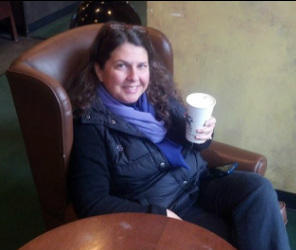As parents we are all asking, given our child's present ages/needs/desires, how can we facilitate their growth? When my daughters were very very small, a friend of mine chastised me for not signing Maggie up for preschool. She scolded, “You are not doing your job. How will she learn how to stand in a line and sit in a circle?” I was amazed by her questions. Really? I had to pay a lot of money (that we didn’t have) and deal with carting them about and taking part in activities, just so they could learn these basic things? My kids were already involved in two unstructured playgroups that were teaching them everything they needed to know at 2 and 4. Just like the lions, our cubs practice in their play the same skills the adults use to survive.
Because our family sees the choices we’ve made as living choices, not schooling choices, we still ask the question, but the answers have changed drastically over the past few years. After being completely independent for a couple of years, Maggie decided to go to grad school, so we supported that goal by allowing her to live with us and being generally supportive as she completed her goal. Now that she is finished and employed, we helped her move out and now we encourage her to come home to visit and do laundry. Elsa lives in Columbus, so our ways of being supportive to her look very different.
How does this relate to being lazy? I don’t believe in creating more work for myself or anyone else. Life continues to present me with difficulties I choose to endure cheerfully because I really have no choice. I have plenty of hard work to do in addition to all of the parts of my life that full of ease. And, for me, all of my parenting choices were about finding a way to meet our goals with ease and without unnecessary effort. Breastfeeding, family bed, child-led weaning, finding families to walk with on our journey, consulting families with older kids when I felt stymied; these are all ways that I found more ease-full than more conventional choices.
We live in a world that values striving, hard work, sacrifice, suffering and deprivation. If you’re not sweating with exertion then you’re not “fulfilling your potential.” In this world it is a chore to do everything and people will exhort you with their struggles, victories and busy-ness as badges of honor. One of my brothers-in-law said that his son needed to learn early that life was hard, that’s why he and his wife put their son in a rigorous kindergarten.
It is hard enough to be a parent without inflicting more difficulty on ourselves and our children. Believe me, life will throw back-breaking challenges at you regardless of what choices you make. Illness, a child’s learning differences, job problems, housing struggles, etc. will give you and your family plenty of opportunity to practice discipline and fortitude. Hard times also help us learn about community, strength and gratitude. We don’t have to avoid difficulty, just not feel obliged to undergo additional hardship because that’s what other people are doing. Education should be every child’s birthright, but it doesn’t need to be toilsome. As a parent, I found the school lifestyle arduous (we tried it for short periods when the girls were curious). When people exclaim, “How did you do it? That sounds like so much work!” I reply, “Having them in school was much harder! How did you manage?”
Almost all homeschooling parents went to school. We need to allow ourselves to be deschooled. That feeling that this can’t possibly be enough stems from the indoctrination we all continue to receive that traditional schooling must be a good and necessary thing or we wouldn’t spend so much time and money on it. I think my kids would have some interesting things to say about their own perceptions of “having got away with something” because they didn’t invest as many years in schooling as their peers did, but they would need to speak for themselves.
So how is my lion pride? In our family I can report that none of us are perfect, but we seem to be functional (for the moment). We all require help from others at times. We all appear to be mature adults capable of holding down a job, finding friends and community, and keeping reasonably healthy habits. We all have the ability to run fast after a wildebeest if we see one that we need. And when we’re not running, we know how to rest and play. Sounds like success to me.


 RSS Feed
RSS Feed